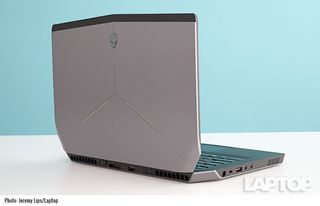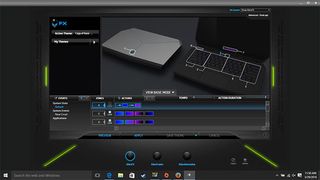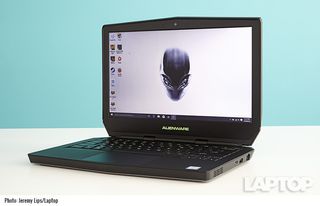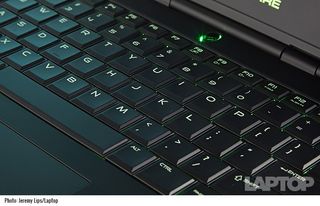Laptop Mag Verdict
The Alienware 13 has a slick design and awesome lighting options, but the budget model's low-res display and middling gaming performance keep it from being a winner.
Pros
- +
Compact, attractive design
- +
Awesome lighting customization
- +
Loud speakers
- +
Decent battery life
Cons
- -
Weak, low-res display
- -
Runs hot
- -
Middling gaming performance
Why you can trust Laptop Mag
When you buy an Alienware laptop, you're guaranteed a few things: a pretty sweet design, cool lighting options and powerfully loud audio. However, if you're looking to pay the bare minimum for the Alienware 13 at $999, you'll have to make some major sacrifices.
The lowest-end version of Alienware's 13-inch notebook packs a measly 1366 x 768 display, which is unacceptable in an era of affordable full-HD laptops. Factor in its middling gaming performance, and it becomes clear -- you'll either have to splurge for a better version of the Alienware 13, or consider some alternatives that offer more for under $1,000.
Design: Tried and True
The Alienware 13 continues to be the most adorable member of Alienware's laptop lineup, sporting the series' usual chunky edges and irregular curves within a compact 13-inch design.

The laptop's gray plastic lid sports the company's signature glowing alien head (you can customize the colors via an app), as well as two small LED slivers that light up when the notebook is in use. You'll be treated to even more glowing lights when you open the Alienware 13 up, with a backlit Alienware logo on the bezel and another illuminated alien head that doubles as a power button.
You can create your own crazy concoction of colors by individually adjusting the backlights, front lights and four keyboard zones.
At 12.9 x 9.25 x 0.69 inches, the Alienware 13 is easy enough to toss in your bag on the way to your next LAN session. Sub-$1,000 competitors such as the Asus ROG GL552 (15.1 x 10.1 x 1.3 inches) and the Lenovo Ideapad Y700 (15.23 x 10.9 x 1.02 inches) are much bigger. The Alienware 13 feels a bit heavy for its size at 4.5 pounds, but the Asus and Lenovo are heavier at 5.6 and 4.8 pounds, respectively.
Alienware Command Center: Crazy Customization
If you go nuts over customizable lighting, you'll probably spend hours with the Alienware 13's ridiculously robust Command Center app. You can choose from a set of pre-installed themes, or create your own crazy concoction of colors by individually adjusting the back lights, front lights and four different keyboard zones. You can even set certain colors to change whenever the laptop is plugged in or running low on battery.

The Command Center's AlienFusion tool lets you optimize performance by setting specific wakeup and sleep settings for when the notebook is plugged in, as well as when it's running on battery. Rounding out the Command Center is AlienAdrenaline, which allows you to program specific actions and lighting settings to each of your games. For example, I programmed the laptop to launch one of my crazier color settings and boot up my favorite strategy website every time I opened Street Fighter V. You can also use this tool to monitor the laptop's overall performance, as well as manage your Alienware Graphics Amplifier, if you have one plugged in.
Display: Not Up to Snuff
Let's get this out of the way: using a gaming laptop in 2016 that lacks full HD just feels weird. I noticed a subtle but consistent dullness to the Alienware 13's 13-inch, 1366 x 768 display, whether I was playing games, watching movies or just browsing the Web.

The laptop's display did show some merit when I watched Cap and Iron Man trade blows in the Captain America: Civil War trailer. The video's myriad colorful super-suits looked fairly accurate, and I could make out small details, from forehead wrinkles to the individual ridges of Captain America's blue suit.
The limits of the Alienware's 1366 x 768 display became much more apparent when I played Street Fighter V, however, as the game's normally detailed backgrounds looked like blurry oil paintings.
Street Fighter V's normally detailed backgrounds looked like blurry oil paintings at 1366 x 768.
The Alienware 13's display exhibited an average brightness of 199 nits. That's significantly dimmer than the Asus ROG GL552's 15.6-inch, 1080p display (272 nits) and not as bright as the Lenovo Ideapad Y700's display (219 nits).
Alienware's notebook isn't the most color-accurate we've tested, with a Delta E rating of 3.89 (closer to 0 is better). The GL552 and Y700 were far more accurate at 0.7 and 0.8, respectively. The Alienware was similarly lacking in terms of color representation, producing just 70 percent of the sRGB color gamut, compared with the GL552's 116 percent. The Lenovo was even worse at 65 percent, however.
Audio
The Alienware 13 offers surprisingly booming sound despite its tiny frame. The notebook's speakers were almost too loud for our testing lab, as I had to shut the door to keep my co-workers from hearing the sounds of my opponent being mercilessly flip-kicked by me. When jamming out to the hard-rock vibes of Thrice's "Blood on the Sand," I enjoyed its rollicking drums and beefy bass, though the track's guitars and vocals got a bit fuzzy at full volume.
MORE: Best Dell and Alienware Laptops
The notebook's Alienware Audio app offers a few extra sound options, letting you tweak microphone settings and toggle between different audio qualities.
Ports and Webcam
Alienware's notebook packs all the connections you need to play at the top of your game, including two USB 3.0 ports for plugging in mice or controllers. There are also headphone and mic jacks, an Ethernet port, and, most notably, a USB Type-C port for quick file transfers and fast charging on supported devices.
On the back of the laptop, you'll find an HDMI port for external displays, as well as a proprietary port for connecting Alienware's Graphics Amplifier. The latter device allows you to use the Alienware 13 with desktop-grade graphics cards.

The Alienware 13's 2-MP webcam took pretty decent photos, accurately capturing my stringy beard and slightly blushed face. While there's some mildly noticeable pixelation, I'd be perfectly comfortable using this camera to chat on Skype or stream to Twitch.
Gaming Performance
Our Alienware 13's Nvidia GeForce GTX 960M GPU handled a decent amount of modern PC games, but not at the highest settings. While the hectic, colorful action of Street Fighter V ran at upward of 60 frames per second with graphics maxed out, I had to lower the settings to medium in order for all the punching and kicking to be consistently smooth.
This configuration of the Alienware 13 handled a decent amount of modern PC games, but not at the highest settings.
Unfortunately, things only worsened when we ran some benchmark tests. The Alienware 13 ran Rainbow Six Siege at 29.3 fps on low settings at 1366 x 768, just missing our 30-fps playable threshold. The game crawled to an even less playable 15 fps on high settings on Alienware's notebook. The 960M-powered Asus GL552 posted better high/low scores of 42 and 84 fps, respectively, even at a higher 1080p resolution.
Interestingly, the Alienware 13 had an easier time with Metro: Last Light: a graphically rich game that just might be better optimized for lower resolutions. The laptop ran the intense shooter's benchmark at a very capable 67.8 fps on low settings, but crawled to a subpar 25.6 fps on high.
The Alienware 13 notched a score of 110,454 on the 3DMark Ice Storm Unlimited graphics benchmark, trailing the GL552 (121,220) and the Y700 (111,182).
Overall Performance
Powered by an Intel Core i7-6500U processor and 8GB of RAM, Alienware's notebook had no issues juggling multiple tasks. I rarely encountered any slowdown while using the laptop, even as I bounced between four Twitch streams, downloaded a game and ran a system scan while playing Street Fighter V in another window.
Benchmarks told a different story, however. The Alienware 13 scored 6,886 on the Geekbench 3 overall performance test, falling way behind the Asus GL552 (13,554) and the Lenovo Y700 (12,589).
MORE: The Biggest Tech Trends of 2016
Alienware's notebook took a somewhat slow 4 minutes and 3 seconds to match 20,000 names to addresses on our spreadsheet test, trailing the GL552 (3:44) and the Y700 (3:36).
Our Alienware's 500GB fared slightly better against the competition, copying 4.97GB of files at a rate of 37.24 MBps. That's a bit better than the Y700's 1TB, 5,400-rpm hard drive (34.91 MBps), but much slower than the GL552's 1TB, 7,200-rpm drive (98.59 MBps).
Keyboard and Touchpad
Aside from lighting up in tons of cool colors, the Alienware 13's keys are mostly enjoyable to type on. There were times when the 2.43-mm deep keys felt just a bit too mushy for my liking, but that didn't stop me from blazing through the Key Hero Typing Test at a brisk 101 words per minute with 99 percent accuracy. The laptop's soft-touch deck was especially easy on my wrists.

The keyboard's S key has a small indent that makes it easy to find your WASD movement buttons, and the function keys provide plenty of shortcuts for controlling volume and brightness, disabling the touchpad and opening the Command Center app.
The notebook's touchpad is just as impressive, providing a matte, 4.2 x 2.6-inch surface that made it easy to pinch-to-zoom accurately and perform multi-finger gestures.
Battery Life
Lasting 6 hours and 43 minutes on our battery test (continuous Web surfing over Wi-Fi at 100 nits of brightness), the Alienware 13 offers enough juice for gaming on a short-flight road trip. It outlasted the GL552 (4:43) and doubled the Y700's 3:20.
MORE: Laptops with the Longest Battery Life
Heat
The Alienware 13 stayed mostly cool during our heat test. After 15 minutes of streaming video, the notebook's touchpad (84 degrees) and keyboard (87 degrees) remained under our 95-degree comfort threshold.
However, the underside grew to an uncomfortable 101 degrees. This only got worse when I played Street Fighter V for 15 minutes, as the laptop's bottom rose to a scorching 130 degrees. You should keep this notebook on your desk when gaming.
Configurations
Our $999 Alienware 13 packs an Intel Core i7-6500U processor, 8GB of RAM, a 500GB SSD and an Nvidia GeForce GTX 960M GPU. A $1,499 config packs a 1080p display and adds an Xbox 360 controller as well as Alienware's Graphics Amplifier. You can get the same package with a 2560 x 1400 display for $1,899.
Alienware's Graphics Amplifier costs $199 on its own, and that's without whatever GPU you choose to put inside of it.
Bottom Line
There's a lot to like about the Alienware 13. Its design is distinct and super-compact, its lighting is insanely customizable and its speakers are loud enough to fill your room. However, with a low-res 1366 x 768 display and gaming performance that's "meh" at best, you shouldn't settle for the lowest-end version of Alienware's slick laptop.
If you're truly set on the Alienware 13, consider its $1,499 config, which packs a 1080p display and Alienware's graphics amp that gives you the option of using a full desktop GPU. But for under $1,000, your best bet is the Asus ROG GL552, which offers a 15-inch, full-HD display and stronger performance for both gaming and computing.
Alienware 13 (2016) Specs
| Brand | Alienware |
| CPU | Intel Core i7-6500U |
| Company Website | wwww.alienware.com |
| Display Size | 13 |
| Graphics Card | Nvidia GeForce GTX 960M |
| Hard Drive Size | 500GB |
| Hard Drive Type | SSD |
| Native Resolution | 1366x768 |
| Ports (excluding USB) | USB Type-C, USB 3.0, HDMI, Ethernet, DC-in |
| RAM | 8GB |
| Size | 12.9 x 9.25 x 0.69 inches |
| Touchpad Size | 4.2 x 2.6 inches |
| USB Ports | 3 |
| Video Memory | 2GB |
| Warranty/Support | 1 Year Hardware Service |
| Weight | 4.5 pounds |
| Wi-Fi | 802.11ac |
